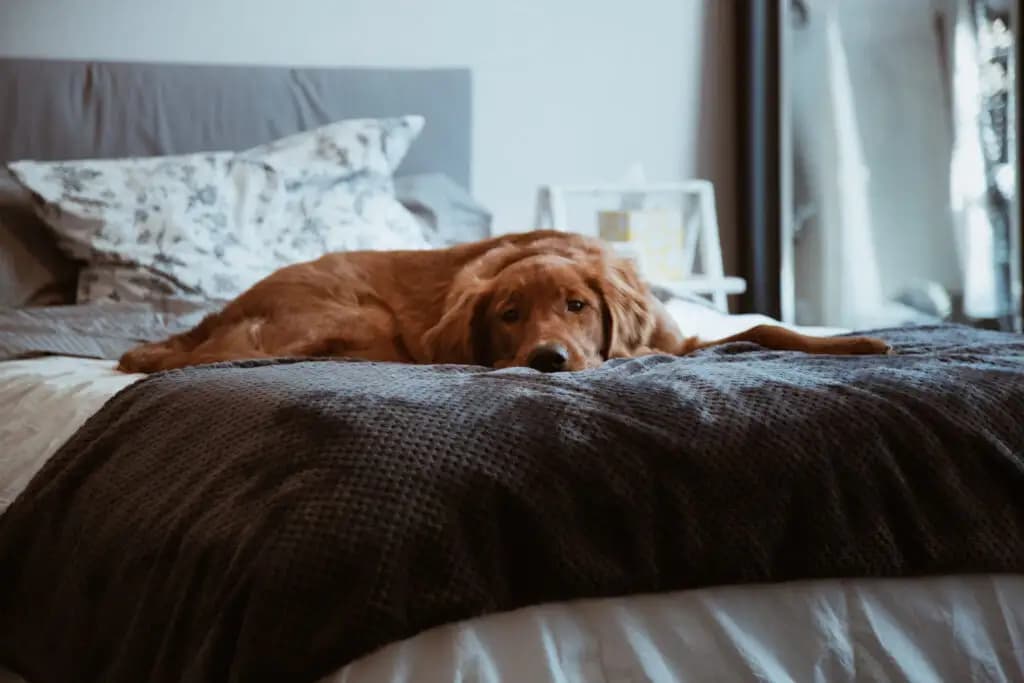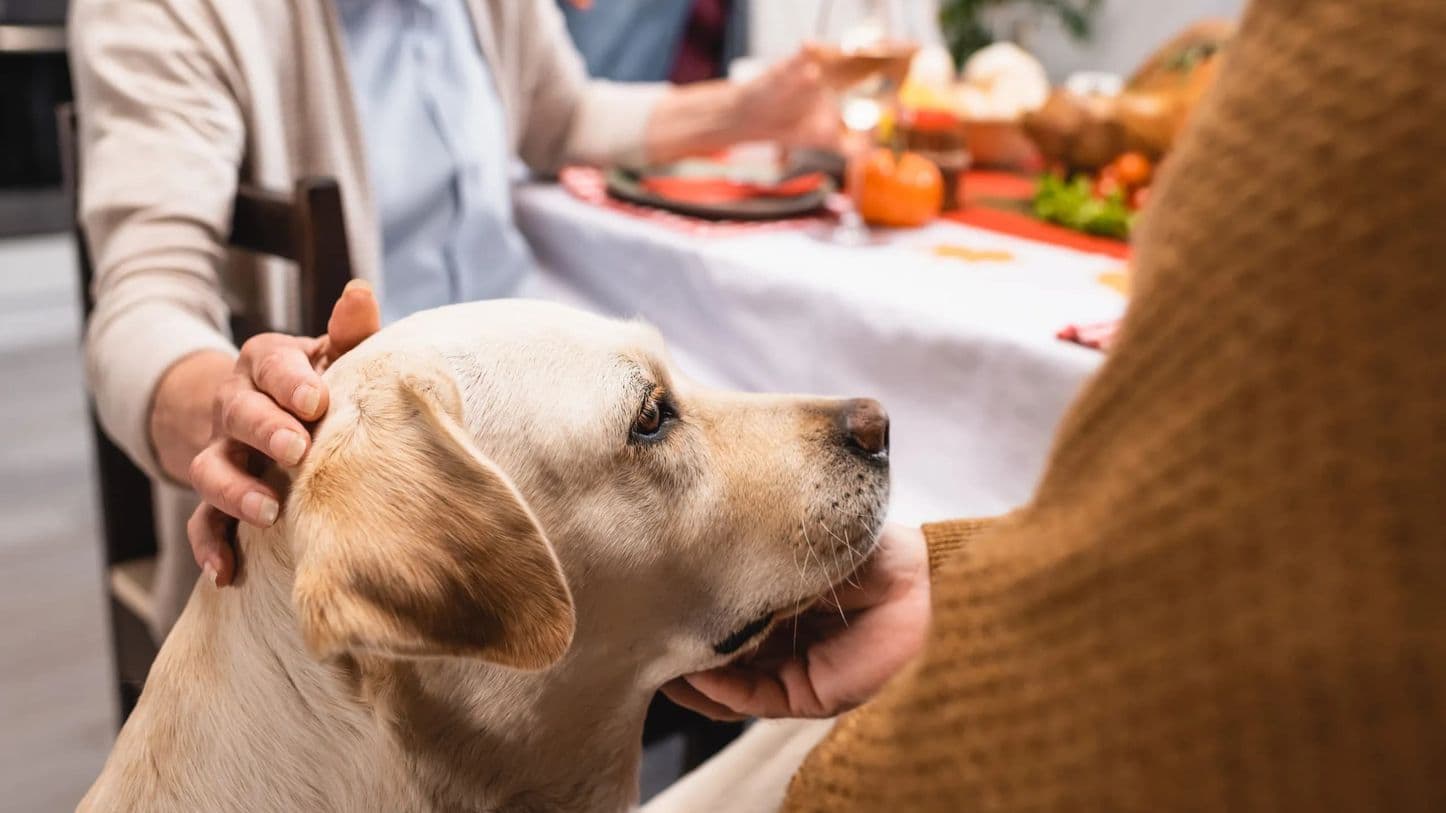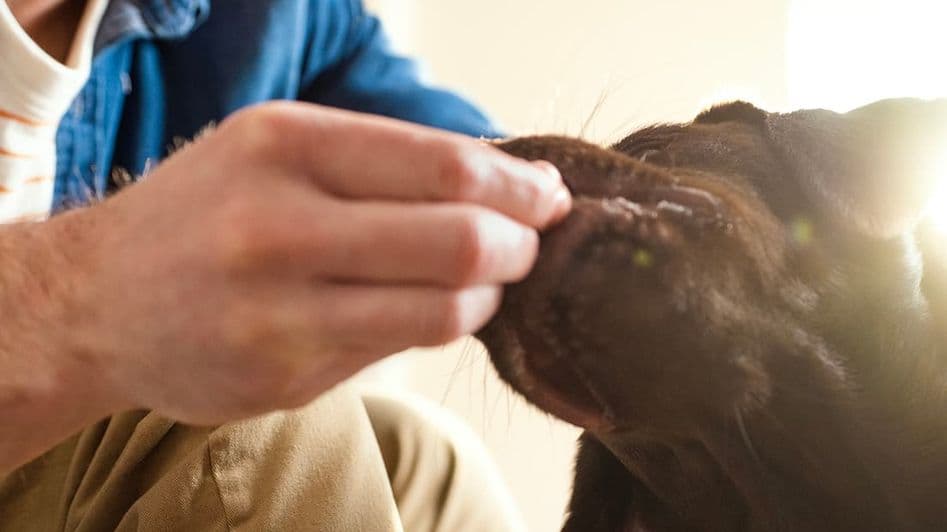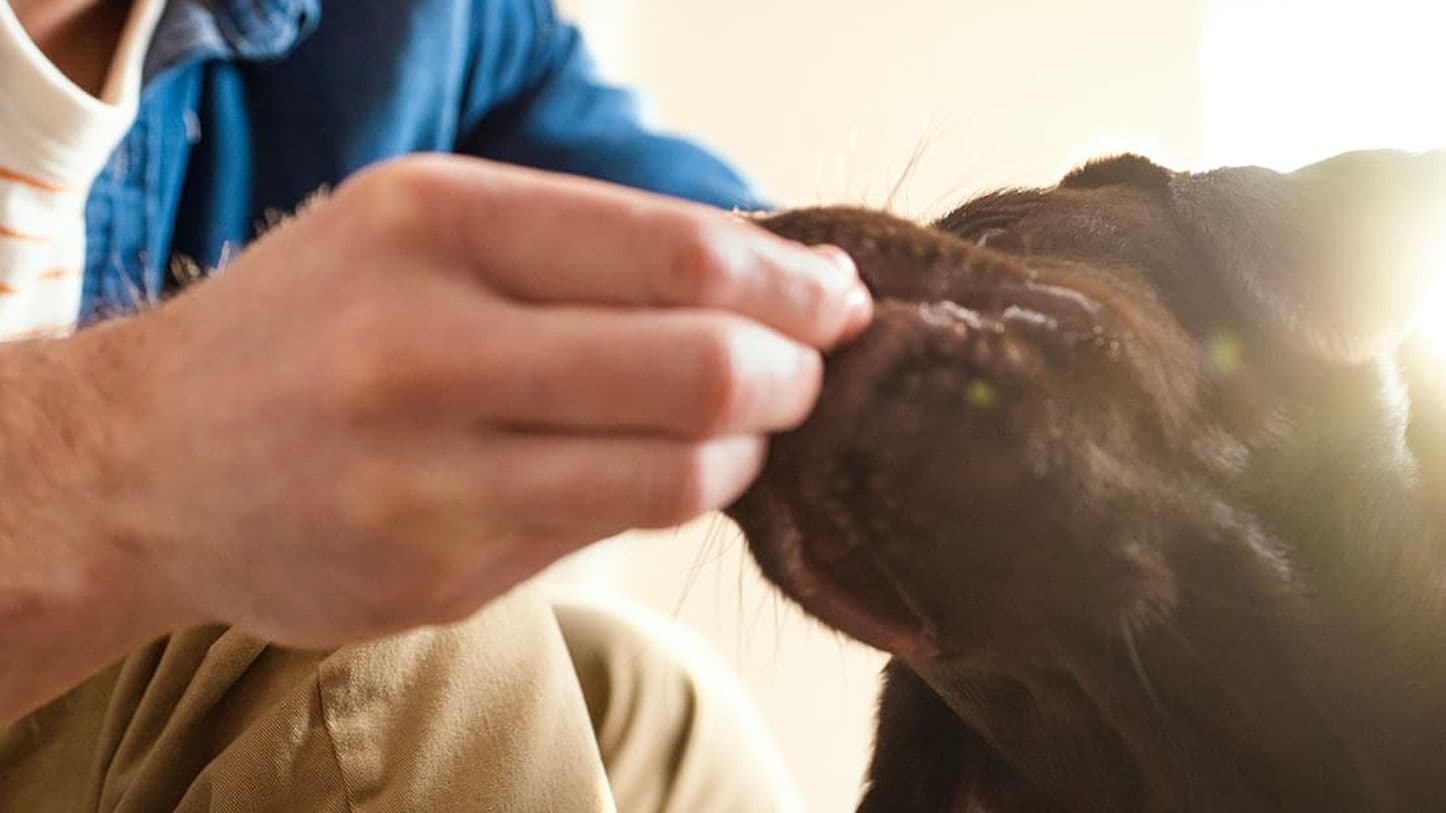
Tips
To Sleep or Not to Sleep: The Pros and Cons of Allowing Your Dog to Sleep in Your Bed
1.31.2022
A survey from the American Kennel Club found that 45% of dog parents let their dogs sleep in bed with them at night and that small dogs are more likely to be allowed in the bed than large dogs.
Despite what some well-meaning neighbors may say, dog trainers and sleep professionals agree: There is nothing wrong with your dog sleeping in bed with you.
Having your best pal in bed with you at night can be comforting. With benefits like shared body heat, a sense of security, and that warm fuzzy feeling of being loved, it’s no wonder you’d want to co-sleep with your pet. However, you may wonder if there are any downsides to letting your pet sleep with you. Here are a few factors to consider before inviting Fido to pull up a pillow.
Does Letting My Dog Sleep in Bed Cause Behavior Issues?
Behaviorally, there’s no reason not to let Fido cuddle up to you at night. Many myths abound that letting your dog sleep in bed with you will cause behavioral challenges, such as making your dog more “dominant” towards you or believing they are the “alpha,” but there’s no real evidence that this is the case (and the “alpha theory” of dog behavior has been repeatedly debunked, anyway).
Letting your dog sleep in bed with you also doesn’t mean they’ll be “spoiled.”
Dog behaviors tend to be rooted in the here and now, so if your dog is being disobedient or having other behavioral challenges during the day, it’s the result of whatever is happening at that moment — not because Fido slept in bed with you last night and is now feeling presumptuous as a result. Dogs just don’t work like that!
However, there is one common behavioral difficulty that, although not caused by co-sleeping, can be exacerbated by it. It’s known as “resource guarding.” As the American Kennel Club explains:
“A dog with resource guarding issues might growl and bark to protect his sleeping spot on your bed. But the problem is really about your dog unnecessarily defending what he sees as his items and territory, not about the co-sleeping.”
If your dog begins resource guarding the bed or “his spot” on it, you may be tempted to interpret this as your dog thinking he’s “in charge” because he’s been “promoted” to the bed. But in fact, what’s happening is the opposite: rather than being too sure of himself, your dog is actually dealing with insecurity and anxiety, which causes him to overcompensate by being defensive of what’s “his.”
If Fido is overprotective of the bed, he may also be resource guarding “his” toys, food, spot on the sofa or even “his” human! Resource guarding — of the bed or anything else — should be addressed with patience and positive reshaping of your pup’s behavior, and may require the assistance of a professional dog trainer.
Will Letting My Dog Sleep in Bed Disrupt My Sleep?
Letting your dog sleep in bed with you doesn’t guarantee you’ll be groggy.
A recent Mayo Clinic study on whether your dog sleeping in bed with you negatively disrupts your sleep quality found that it generally does not. While your dog may wake you in the night now and again, the study found that for many pet parents, the benefits of co-snoozing outweighed being occasionally woken by a doggy snore.
At least one sleep study has found that women sleep better with a dog than with a cat or spouse. According to the lead researcher of the study, Dr. Christy Hoffman:
“We found that women commonly rate dogs as better bed partners than cats and human partners and report that their dogs enhance their sleep quality.”
Is Letting My Dog Sleep in Bed Unhealthy?
Finally, if you’re worried about whether it’s unsafe for your health to let your dog sleep in the bed or if it increases your risk of disease transmission — don’t be!
Yes, there may be more dog hair in the sheets, but let’s face it: you’re already in close daily contact with your dog, hugging them and brushing them and giving them kisses. Sharing your bed with your pooch at night is no more unhealthy than sharing the sofa with them during the day.
Of course, for basic hygiene, you’ll still want to brush your dog frequently and not let them jump on the bed with muddy paws. But be assured that your risk of getting sick from snoozing with Fido is pretty minimal!
Why You May Want to Let Your Dog Sleep in Bed With You
They keep you safe and warm
Sleeping with your dog helps you feel a sense of comfort and security. Many pet parents report feeling safer with their dog sleeping in bed by their side, knowing that their loyal watchdog will alert them to any dangers. Your pup can also act as a furry hot water bottle, keeping you warm on those chilly winter nights. Both of these factors can help you to fall asleep quickly and sleep more deeply.
They ease your anxiety or depression
The Anxiety & Depression Association of America refers to it as the “pet effect”: it’s the way our pets help us to fight depression and other mental health challenges.
Co-sleeping with your dog enhances this pet effect, reassuring you that you’re not alone. Letting your dog sleep in bed with you has been known to reduce symptoms of PTSD, night terrors, and other sleep disorders.
Cuddling boosts your bond with your dog
Letting your dog sleep in bed with you strengthens your feelings for each other — and we can prove it.
Studies show that when you pet or snuggle your dog or even just gaze lovingly into their eyes, your brain releases a hormone called oxytocin. This is the same chemical released when you hug someone, sometimes called the “love hormone,” because it gives you that warm, fuzzy feeling. Oxytocin also reduces levels of the stress chemical cortisol, lowering your heart rate and blood pressure.
That flood of oxytocin you get from cuddling Fido makes you feel more tender and affectionate towards your loyal pup. And best of all, when your dog gazes lovingly at you, their brain releases oxytocin, too! That’s right, it’s not just wishful thinking: if your dog stares at you like they adore you, they really do.
That relaxing feeling as the two of you snuggle is one of the major upsides of your dog sleeping in bed with you. (That also means you shouldn’t feel guilty the next time you and Fido take an afternoon nap together. You’re not being lazy — you’re hard at work building a stronger human-canine bond!)
Why You May Not Want to Let Your Dog Sleep in Bed With You
Your dog may wake you (or vice versa!)
Although studies show most people who co-sleep with their pets enjoy it, your mileage may vary. You may not want to let your dog sleep in bed with you if Fido does prevent you from sleeping well.
Your dog may be a restless sleeper and move too much in the night or wake up and bark at every little sound. They might make the bed uncomfortably hot, especially in summer or if you have a large or hairy dog. And to be perfectly honest: if your precious little angel is loudly snoring or farting all night long, they may not be the best bedfellow for you.
If you don’t get a good night’s sleep, you may be tired and grumpy in the morning. If you grumble at your blissfully oblivious pup the next day, recognize that perhaps sleeping apart is better for all parties.
Of course, being a good sleeping buddy goes both ways. Your dog may not want to sleep in your bed if you disturb their sleep! As Veterinary Centers of America points out:
“When considering a dog’s perspective, some dogs get too hot when sleeping in a bed and prefer to lie on a cool floor. Others like to change sleeping quarters several times a night — sleeping first on the kitchen floor, then the bathroom rug, then the sofa. Sleeping at ground level makes this easier. Also, some people are restless sleepers and disturb their dog’s slumber.”
Let’s face it: You’re just as likely to snore or to thrash around in your sleep as your dog is. If your pup gives you the side-eye and leaves the room to find somewhere quieter to snooze…well, they’ve made the decision for you!
Your human partner may disagree
If you already have a two-legged sleeping companion (or acquired one), they may not find Fido’s snoring as adorable as you do. Many family disagreements have revolved around one partner who loves snuggling with the pet and one who would rather not!
Those are boundaries you’ll have to negotiate together — but whatever you decide, make sure to be as consistent as possible. If one day Fido is allowed in the bed, the next day he’s barred, and the next day he’s allowed back again, that will confuse your poor pup and make your household rules feel random and arbitrary.
Dogs love routine and predictability as much as we do, so once an agreement is made, try not to change your mind too much. (Honestly, most pet parents who enjoy snoozing with their pup will tell you that they’d boot out the boyfriend before they’d kick out the dog!).
If you want your dog to start sleeping somewhere else, make the transition slow (so the rules don’t change overnight) and do everything you can to make Fido’s new sleeping spot as appealing as possible. One way to build positive associations with your dog’s bed or crate is to keep a few of Fido’s favorite treats on the bed at all times so that whenever they nap there, they discover a delicious surprise!
You may find it too dirty, or you may develop allergies
It’s an unavoidable fact that sharing the bed with your dog also means sharing the bed with your dog’s hair. If your pup is a heavy shedder, that may mean that you wake up with pajamas that match your dog’s coat!.
You’ll need to change your bedsheets more frequently if you plan on co-sleeping with your dog. You’ll also want to keep up with your dog’s grooming to reduce the amount of fur in your bed.
If Fido is suddenly making you sniffle and sneeze, you may wish to hold off on co-sleeping, so that your new sensitivity to your best pal doesn’t get worse.
Your senior dog may need their own bed
You should always be aware of your dog’s physical limitations, especially as they age and enter its golden years. One consideration to be aware of with elderly dogs is that they may be more likely to have a potty accident, so by continuing to sleep with them, you’re running the risk of wet bedsheets.
Another consideration is that if your senior pup suffers from arthritis or mobility problems, jumping on and off a bed may not be a good choice for them. The impact of jumping can make their condition worse.
If your best buddy is moving slower these days, but you still want them up on the bed with you, get into the habit of carefully lifting them on and off the bed yourself to reduce the impact on their joints. Pet stairs or a ramp may also help your dog safely get up onto the bed and back down again.
Ultimately, a specially designed orthopedic pet bed to support those elderly joints may be the best option to reduce the risk of injury for your geriatric companion. You can place this bed on the floor near you, so that your buddy can still hear and smell you and know you’re there.
Your puppy may still be potty training
Finally, you may not want your dog to sleep in bed with you while they’re still a puppy. Teaching your new pup to sleep in a crate instead helps their potty training go much smoother.
Don’t worry — you can always welcome Fido into bed with you once they’re fully housetrained!
The truth is, either way, it works perfectly fine! As the American Kennel Club puts it:
“For a well-adjusted, well-behaved dog, it’s quite unlikely that sleeping in your bed or bedroom will do anything except delight your dog, comfort you, and enhance the dog-owner bond.”
So it’s up to you and your pet to find the sleep solution that works for you. As long as you and your pup are happy and getting a good night’s sleep, don’t feel bad about snuggling your pet all night long!
For more information on Vital Essentials and our full product line, follow us on TikTok and Instagram. And if you have any questions, be sure to check out our FAQ page for answers. Together, we can ensure your pet gets the proper nutrition they deserve.





